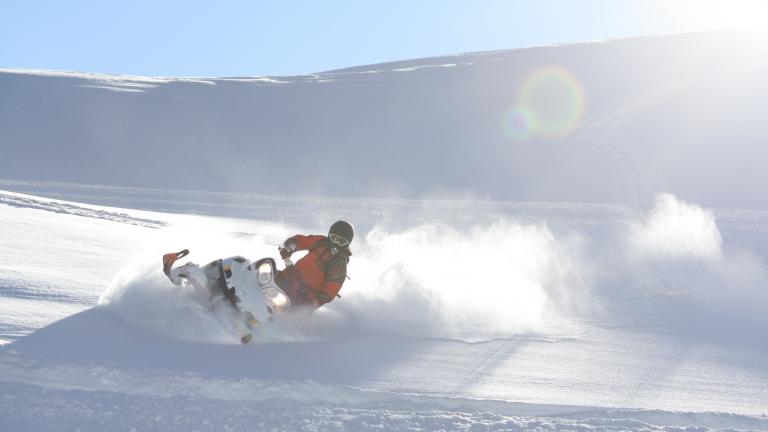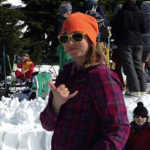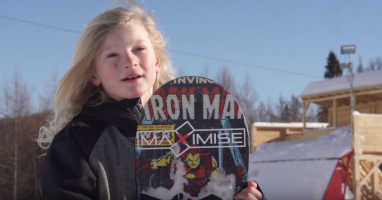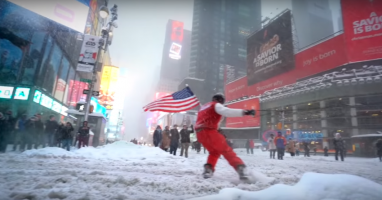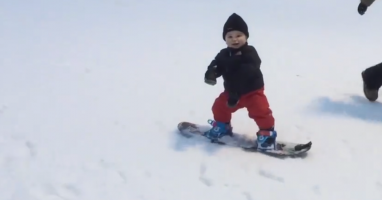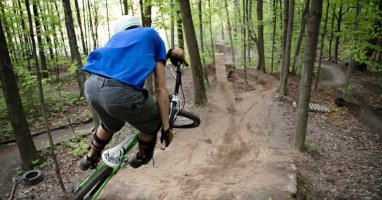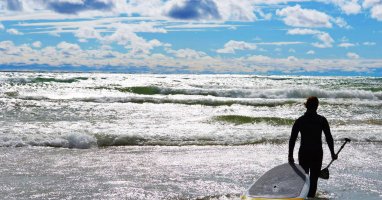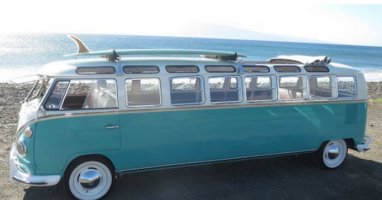He has spun the first back-side 1080 in competition and the first front-side 1440 ever in a halfpipe. He has represented us at the Olympics and was the first Canadian to win at the Burton European Open. But did you know this half pipe champ studied Buddhism? Loves art? That he slashes powder in the backcountry as well as he hucks in the halfpipe? Well now you do.
There’s a lot more than what is on the surface with this talented athlete. Crispin Lipscomb is like a few people in one. Backwoods yet worldly, passionate but can be totally grounded. A performer yet shy, complex yet simple.
A fierce intellectual, yet one gets the impression that he could just as easily discuss Voltaire as sled models. Or just kick back and play a game of NHL whatever on the X box.
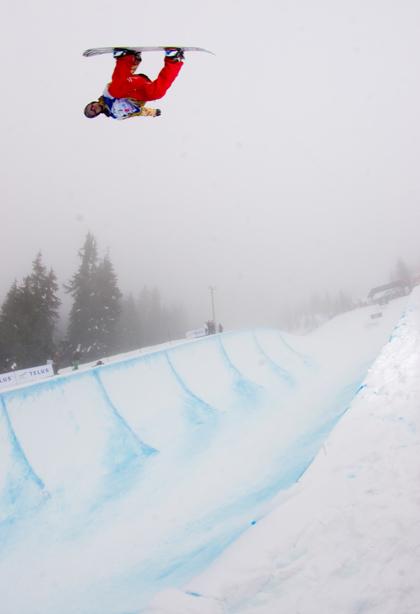
It ain't easy being steezy - Crispin in '08 - Hockenstein Photo
Such a contrasting world was set on Lipscomb early in life. A child of divorce from a young age and the middle child out of six, his time was divided between rural living deep in the Ontario woods and travelling the world with his mother, a gender rights worker. It was on a trip to his province of birth, Alberta, however; that Lipscomb discovered snowboarding in Jasper at the age of 13.
Before that the young Lipscomb was shredding concrete in Ottawa skating with Canadian legend Rick McCrank. In snowboarding he found his winter pass time. In his late teens he moved to western Canada and moved from slacker snowboard instructor to National Team member on his way to the Olympics by the time he was 22.
After being discovered by Tom Hutchinson at the US Open, (one of the oldest still running snowboard contests), the half pipe shredder really had a chance to spread his wings, flying all around the world, winning in Colorado (gravity games), Japan (world cup) and Switzerland (European open). Riders he was looking up to yesterday, were now his peers.
Contests’ or coaching Lipscomb is never one to turn down an invitation. While coaching in Korea, he befriended Korean Buddhists monks and was invited to do a temple stay. Buddhism was a philosophy he took to. “It really struck me and hit me close to my heart.” Lipscomb says. He didn’t know it at the time but his lessons learned in that mountain temple would prepare him for what happened next.
After a few years of giving snowboarding the laser focus required of an elite athlete, a tragic event caused Lipscomb’s focus to switch. After the untimely death of a good friend and fellow shredder, Anthony Crute, the half pipe prodigy changed his focus to friends and family.
At the age of 33 Lipscomb has been out of the competitive world for three years except for 2011 when he placed 3rd at the Nationals in Calgary. Things are still non-stop in the snowboard universe, for he is constantly dreaming up new projects. Some such as creating halfpipe events, coaching ProRide camps with one coming up in March as well as working on a line of unmanned cameras. For the next few months the halfpipe veteran will be coaching our Olympic candidate Katie Tsuyuki. “It’s sort of like being on tour again, but I don’t get to do the riding,” Lipscomb laughs.
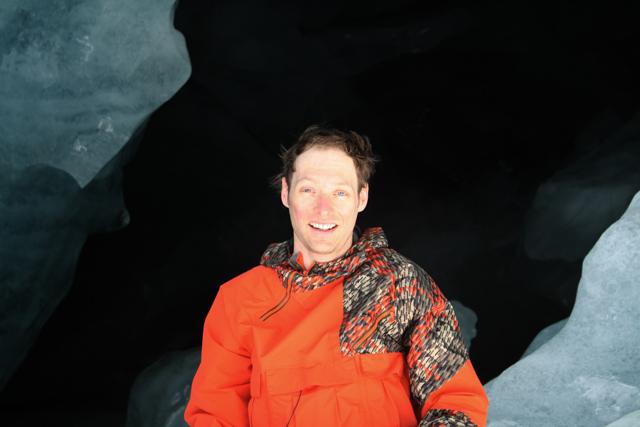
A happy boy far from a halfpipe
With all he has accomplished you would think this guy would have one blown up ego but true to form Lipscomb is hard to pin down and predict. When you think he should be one thing he’s something else. He works with monster corporations but you wouldn’t guess it as the successful athlete rips around Whistler/Pemberton in a two shades of brown ‘80’s cowboy truck with a sled in the back. His jacket not shiny and bling but stained with and likely smelling of two stroke.
He has competed in the big show but he is just as happy to show kids a few tricks in the Pemberton skate park. He seems just as comfortable under the bright lights of the CBC studios as in the dimly lit Pemberton Hotel. In the near empty bar on a Saturday night, with just and couple good ‘ol boys taking the edge of a work day and us, this where Lipscomb is nice enough to meet me for a short interview before he jets off to Utah.
KH: I remember you telling me about your childhood it’s pretty interesting your upbringing.
CL: Oh, ya. My parents were both immigrants from England, came in their 20’s, chasing the dream. They divorced when I was eight months old. Then I got a chance to live in Africa for the first two years in Zambia where my grandpa was working on an Amethyst mine. Then I spent half the time with each family, me and my mom travelled around we got to go to all sorts of cool parts of the world ‘cause she started working in agriculture development, and gender issues, gender rights. Starting out in Southeast Asia, and Nepal, Bangladesh and Pakistan. Now Mongolia a bunch and Sri Lanka and ya, I don’t know just everywhere.
That was a really big influence I think because she did it all on her own out there. I always respected her for working so hard. She didn’t remarry until my late teens or something like that. While my Dad on that side kept building and building, with six kids we lived out in the bush on a hundred acres with no tv, no candy and home-made bread, a quarter of our food came from the garden.
Two quite contrasting worlds, with one single child travelling around and the other big family with older brothers younger sisters.
KH: So when did you start sledding and getting into backcountry?
CL: I always kind of heard about it and knew about it. In 2003 I won a snowmobile in a contest on Blackcomb. I didn’t even know how to start it DCP had to show me how to start the thing. But I sold it to pay for the contest tour. Then I kept my head down and got into the Olympic goals. Right after the Olympics I bought myself a new sled as a reward. Then used it twice and won a brand new one again at the Ski and Snowboard festival. So I was really lucky I got to start on a new sled, an Artic Cat, I got to shred with some really good riders. Was sort of hosted out there. And I just loved it, I didn’t grow up with machines at all so I had a lot to learn. A lot to learn about throttle, airing those machines but I came from so much snowboarding and I’d been so much in the mountains that, is was just learning how to apply some of those basics made it a lot easier. But then I got so hooked on it it really kinda started to take focus away from my competing sometimes. It’s good to get out there and shred it puts a new perspective there to ride pipe all week. But then I was starting to do all the work outs for the sledding and not so much at all for the National team stuff. ‘ Cause we had to train all the time and meet all these bench marks I just went sledding and got stronger than I ever was snowboarding.
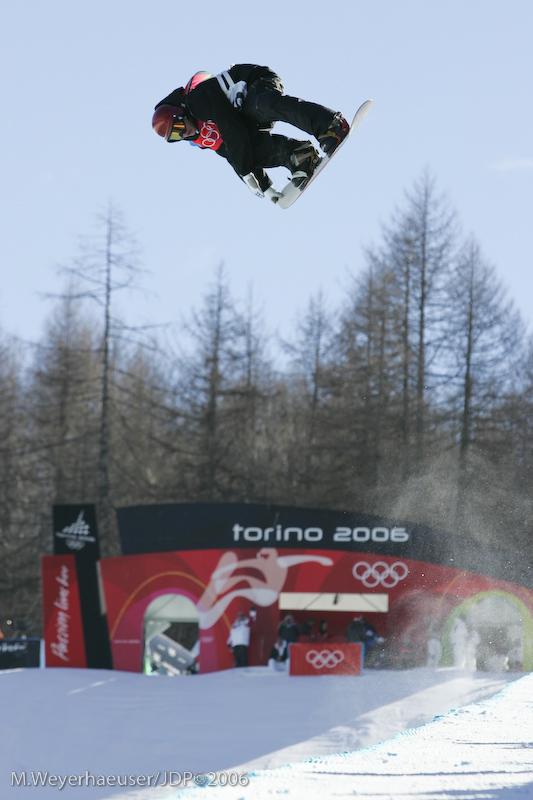
Representing his country at the 2006 Olympics
KH: So why halfpipe? What drew you into that?
CL: Why halfpipe?
KH: Ya, You could do anything you want, what makes you want to ride the halfpipe?
CL: Ya halfpipe there’s something in there there’s something about it. Riding through those transitions, when you get it right off the start you know it’s happening you know that it’s gonna be right then you can just relax. You just spend all your time doin’ it wrong so maybe there was a stubborn part in me that wanted to keep on that. But it feels so good the pipe. But you know, riding pow and dropping things…you I think I instinctively go over to halfpipe shaped things when I ride. I’m always doing round things and wall rides always trying to get that hang time up there. Jumpin’s cool to but halfpipe is way tougher. You can apply everything you learn there. It’s the last place your gonna learn something new and it’s the last place you can apply what you know and it’s the first place to test yourself, when your seen’ where you’re at.
It’s always there. I like the halfpipe, because it’s just sitting there. All the possibilities are available. But it’s up to you to let it happen. I’m in this new headspace now where ya it’s all there. You just have to let it happen. None of this trying to make it happen, it’s too much work. It’s too risky. You just let it happen, that’s the game I think.
KH: One last question. What’s one thing about you not many people know?
CL: Well, I’m really into art. I just did my very first painting, acrylic on canvas. I’ve been doing a lot of wood work and art.
Well there you have it. One thing is for sure; whatever happens here on out there is no doubt Crispin has a passion for the sport and a generous spirit that makes him a worthy rider to look up to.
For a chance to shred with this Canadian icon join Crispin Lipscomb March 6-8 2013 for a three day pipe camp with Pro-Ride snowboard camps in, Whistler, BC. For more details go to http://www.pro-ride.com/specialty-programs
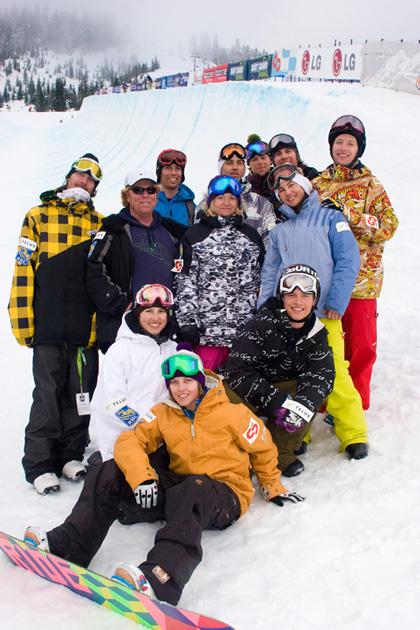
Crispin (big smile top right) with the 2008 Canadian National Team

